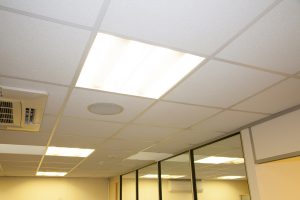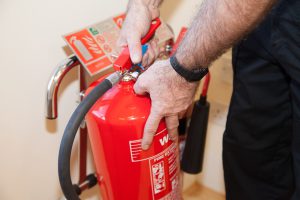Why Do I Need My Fire Safety Equipment Maintained?
One of the most important aspects of health and safety within any industry is the equipment used in the fight against fire. This includes all deterrent, detection, warning and firefighting components, such as smoke detectors, fire alarm systems, fire extinguishers, safety doors, emergency lighting and more.
Simply having these items installed and training your staff in their operation is not enough to uphold effective fire safety – they must also be regularly inspected and maintained.
Under the guidelines of the Regulatory Reform (Fire Safety) Order 2005, a nominated ‘responsible person’, usually the employer, building owner or landlord, is charged with carrying out a fire risk assessment. This includes inspecting all areas of the premises for fire hazards, keeping a carefully written log of all findings and actions taken, as well as ensuring that all staff are fully trained in firefighting and evacuation procedures.
Fire equipment maintenance falls under the duties of the responsible person, and checking for any necessary maintenance and upkeep will need to become a part of the fire risk assessment.
Equipment Checks
With a mix of passive and active fire protection equipment present on site, you will have to consider each component’s role carefully to determine how regularly they will need to be inspected.
Here are a few basic ones to get you started – remember: be sure to make a note of all checks in your log book.
- Daily
 Check that all fire doors are to an acceptable operational standard, that they close firmly and that they can be opened easily. Remove any obstructions throughout the evacuation route immediately.
Check that all fire doors are to an acceptable operational standard, that they close firmly and that they can be opened easily. Remove any obstructions throughout the evacuation route immediately.
If possible, test emergency lighting for faults, and ensure that all signage is clearly visible.
- Weekly
Manually test all fire alarm equipment and that batteries are still operational in all smoke detectors. Checking alarms at the same time every week will avoid panic among staff as they will be expecting it.
- Monthly
Perform a thorough check of all emergency lighting systems for sufficient illumination, logging any findings.
Carry out a more detailed check of fire doors, making sure that the intumescent seals and frames are in good condition.
- Annually
All fire protection equipment, including alarms, detectors, lighting, sprinklers, extinguishers and fire doors should be thoroughly inspected by a qualified and accredited technician.
Fire extinguisher checks should be carried out throughout the year also, as detailed below.
Fire Extinguisher Maintenance
 As one of the more prominent pieces of firefighting equipment, fire extinguishers will require a more tailored approach to maintenance.
As one of the more prominent pieces of firefighting equipment, fire extinguishers will require a more tailored approach to maintenance.
The maintenance of fire extinguishers starts the moment they are delivered to your place of business. Every unit will need to be ‘commissioned’ by a BAFE-approved technician, ensuring that they have not been damaged during transit or manufacturing, and that it meets BS EN 3 standards.
- Monthly
Check that the pressure gauge is in the correct position, and ensure that all signage and operational instructions are visible and clear. The extinguishers should be appropriately positioned near areas where their use is most likely needed.
These checks can be performed by the ‘responsible person’ in charge of fire risk assessments.
- Annually
This should be a more thorough and detailed check performed by a BAFE-approved technician. Any signs of corrosion will be sought out, while each component will be tested individually.
The unit will also be weighed, and certification will be provided if it passes inspection.
- Five Years
Approximately every five years, extinguishers will undergo ‘discharging’. This entails an emptying and refilling of the unit, allowing for the accredited engineer to check the interior of the extinguisher for faults as well as the operational components.
Here at Scutum London, we provide professional maintenance services for your fire alarms, fire extinguishers and other fire safety equipment. Get in touch with us now to arrange a site visit from a member of our experienced team.
Request a Callback
Just fill in your details below and we'll get back to you as soon as we can!

About Scutum London
Scutum London is a leading expert in fire safety and security solutions for businesses and organisations located across South East England, including London and Surrey.
From fire alarms, fire extinguishers and fire risk assessments to access control, CCTV and intruder alarm systems – and a lot more besides – we offer a comprehensive range of products and services designed to keep you, your business and your staff and visitors safe.
With decades of industry experience to call on, we’re proud to hold accreditations from leading trade associations and bodies such as British Approvals for Fire Equipment (BAFE), the British Fire Consortium, the Fire Industry Association (FIA) and Security Systems and Alarms Inspection Board (SSAIB).
If you’d like to find out more about Scutum London, get in touch with our friendly team or explore our products and services on our site.

